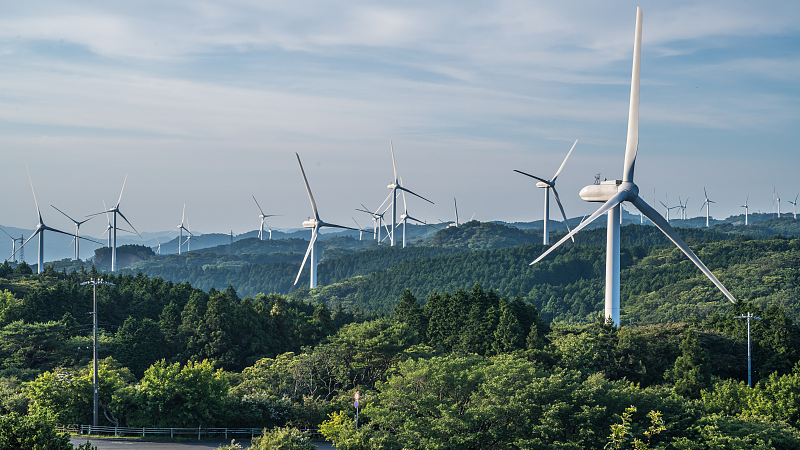
A worker inspects photovoltaic solar panels in an array at the Senergy Santhiou Mekhe PV solar plant in Thies, Senegal. /Getty
A worker inspects photovoltaic solar panels in an array at the Senergy Santhiou Mekhe PV solar plant in Thies, Senegal. /Getty
Editor's note: Jon Creyts is the Chief Executive Officer of RMI (Rocky Mountain Institute) and an internationally recognized leader on global energy issues and climate change. The article reflects the author's opinions and not necessarily the views of CGTN.
The 27th Conference of the Parties to the United Nations Framework Convention on Climate Change (COP27) is returning to Africa. For two weeks, global leaders will flock to Sharm El-Sheikh, Egypt, to address the challenge of climate change and re-negotiate nationally determined contributions for reducing carbon emissions. This year, with the event strategically happening in Africa, COP27 will prioritize the needs of the Global South, putting issues of energy access, adaptation, resilience, and climate finance at the center of discussions.
As the backdrop of COP27, we see climate change bringing about monsoons across Asia, devastating floods in Pakistan, forced migration in Africa, and hurricanes destroying cities in the United States. The World Meteorological Organization provided the sobering science that global warming is likely to exceed 1.5°C, even if temporarily, with about 50 percent probability over the next five years. All the tipping points are coming faster than expected.
We know that the energy transition must include the entire world if it is going to change the tide of climate distress. COP27 is coming at a critical moment in this decisive decade, and emerging economies are essential to the transition. Resilience to natural disasters, economic downturns, and public health is a critical aspect of the energy transition that doesn't receive the attention it deserves. By bridging the international development and climate communities, the conversation can center on how transitioning fossil-based energy systems to distributed renewable-based systems can build resilience in Africa, Southeast Asia, and vulnerable island nations.
A critical piece at COP27 will be unlocking finance for climate adaptation and resilience in the Global South and to ensure the process is scientific, needs-based, and equitable. Estimates indicate that we must mobilize $32 trillion of investment over the next decade, and $125 trillion by 2050, to transform global economies to avoid the worst physical impacts of climate change. Private actors could provide up to 70 percent of this financing globally, offering huge opportunities for investors.
We need tens of thousands more skillful, capable professionals throughout the Global South market ecosystem, from policymakers, regulators, and utility operators to financiers, project developers, and more. The global workforce requires increased capacity to take on the implementation steps to make the energy transition come to fruition. RMI (Rocky Mountain Institute) is providing solutions to this challenge through the Energy Transition Academy, which offers a fellowship for energy leaders in the Global South with technical training, critical decision-making, and connection to expert support to advance local renewable energy projects.

In addition to upskilling tens of thousands of professionals to ramp up radical implementation, we need experts who can create policy and regulatory environments to enable the energy transition at the scale and speed to meet 2030 climate goals. Through the African School of Regulation, the Energy Transition Academy is also working with partners to develop, teach, and disseminate knowledge to regulators across 30 African countries seeking to support the electrification of millions.
In both Ethiopia and Nigeria, RMI is effectively testing and demonstrating the benefits of efficient demand stimulation and the productive uses of energy in agriculture. By focusing on enabling market-led solutions and breaking the silos separating electrification and agricultural development, we can catalyze economic development and improve rural livelihoods while producing cleaner, more efficient energy.
The old model of development where under-resourced countries must scramble through red tape to access a small pot of public sources must change to those countries taking the lead on transitioning their energy systems and economies to be climate-aligned, thereby inspiring and attracting others to do the same. Supporting local actors to take the lead on climate through home-grown approaches is the only hope to mobilize climate finance and scale the clean, resilient projects that the Global South needs.
While these are promising advancements throughout Africa led by private sector and philanthropic support, all eyes will be on financing outcomes in Sharm El-Sheikh, and whether the wealthiest nations will agree to support adaptation efforts for the most vulnerable countries. Ministers from the V20 countries (58 climate-vulnerable economies; 27 of which are from Africa and the Middle East) estimate that 20 years of impacts have cost their countries $525 billion.
African nations are losing from five percent to 15 percent of GDP annually due to climate impacts, according to the African Development Bank. While Denmark recently agreed to offer "loss and damage" compensation to the most vulnerable countries, it is not nearly enough.
Big players like the United States, the European Union, as well as China and India from the South, can turn the tide to ensure the energy transition truly is equitable and just, and COP27 is the critical moment to make it happen.
(If you want to contribute and have specific expertise, please contact us at opinions@cgtn.com. Follow @thouse_opinions on Twitter to discover the latest commentaries on CGTN Opinion Section.)